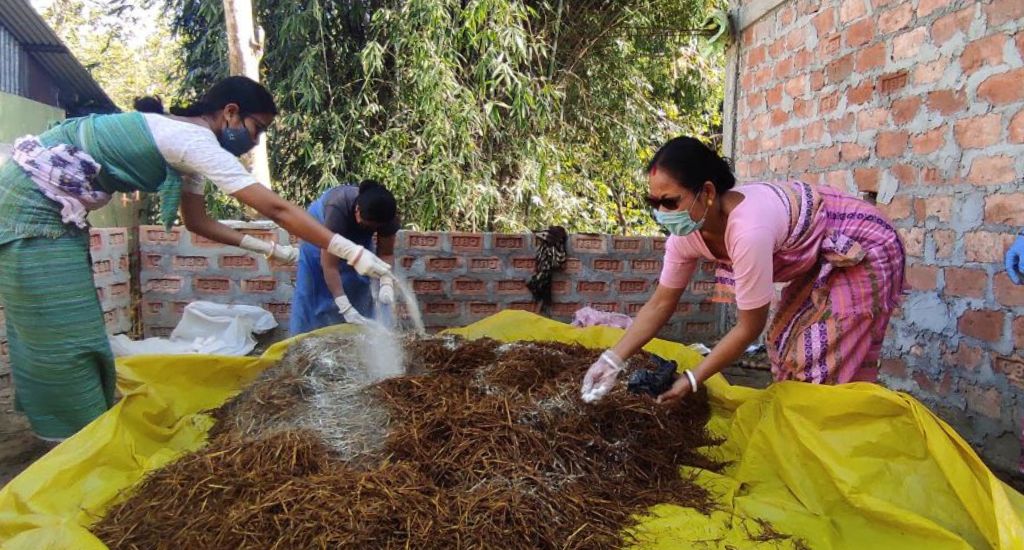
Hope mushrooms for these women of flood-prone Barpeta
A few months ago, four brave women from the Bodo tribe in Assam's Barpeta district started a mushroom farm, bringing hope and empowerment to their flood-prone, poverty-stricken village.

A few months ago, four brave women from the Bodo tribe in Assam's Barpeta district started a mushroom farm, bringing hope and empowerment to their flood-prone, poverty-stricken village.
Barpeta district, surrounded by the tributaries of the Brahmaputra, often faces nature’s fury. Floods destroy homes, livestock, and crops every monsoon, forcing residents to rebuild constantly. Among these resilient people are four women who show great perseverance with mushroom cultivation.
They worked tirelessly in the fields for years, earning barely enough to sustain their families. Their family members often migrated to distant cities for better opportunities, leaving them to bear the burdens alone. Despite these relentless challenges, they never lost their spirit.

The women come from underprivileged backgrounds, relying mainly on farming for income. As part of Sanjog’s mission to improve rural livelihoods and empower women, these women were trained in mushroom cultivation. They started small, with just 20 mushroom cylinders. Setting up the farm was challenging. The women had to learn every detail, from preparing the substrate to maintaining the right conditions for growth. Each step was a learning experience, but they faced it with determination.
The idea of starting a mushroom farm began with a community development initiative led by Sanjog, a non-profit organisation based in Nalbari. Recognising mushroom cultivation as a sustainable livelihood, Sanjog provided training and initial raw materials to these women. With hope and eagerness, they embraced this new venture.
The NGO focuses on farm mechanisation, women’s empowerment, and rural livelihood enhancement. The community is grateful for Sanjog’s efforts, which include organising various training sessions. Notably, Sanjog has conducted training on scientific potato cultivation, integrated nutrient management, and hands-on mushroom cultivation.
The success of the mushroom farm has inspired others in the village to explore alternative livelihoods. The farm provides direct employment to the four women and creates additional opportunities for others. Local vendors supply materials and small businesses benefit from increased economic activity.
The farm has also fostered community pride. Villagers now see their potential and are motivated to work toward collective prosperity. The project has attracted attention from local authorities and NGOs, who are considering similar initiatives to uplift the region.
The humble backgrounds of the four women did not deter them, instead, it fuelled their resolve to create something meaningful.
Also Read: Anita Devi of Anantpur works magic with mushrooms
In December 2023, they installed 100 mushroom cylinders. As the first batch of mushrooms grew, so did the women’s confidence. The farm became a symbol of their strength and resilience. What was once empty land turned into a thriving enterprise. The initial earnings from the mushroom farm, though modest, made a significant impact.

By February 2024, they had sold 42 kg of mushrooms, both dry and fresh, with 3 kg kept for household use. They earned Rs. 9000 from sales, while the production cost was Rs. 6000. This economic success marked the start of a sustainable income for these women.
The initial success allowed them to reinvest profits and expand their operations. From the initial 20 cylinders provided by Sanjog, they have now grown and maintained over 100 cylinders on their own. This expansion shows their hard work and the potential of their venture.
Each of these four women has a story that adds depth to this narrative.
Papori Deka continues to work in the fields but now has extra income to support her family. Renu Bodo, who always dreamed of financial independence, is starting to achieve that with the farm’s earnings. Arati Bodo, who struggled with seasonal farming’s uncertainty, now finds stability in the consistent yield of mushrooms. Phanja Bodo, still working hard in her primary job, sees hope in the growth potential of their mushroom venture.
Their stories are intertwined with their village’s history. They have become beacons of hope, showing other women that with determination and support, it is possible to break the cycle of poverty and despair.
They dream of expanding the farm, diversifying their produce, and training more women in mushroom cultivation. They envision a future where their village thrives despite the adversities brought by floods. Their story is a poignant reminder of the power of resilience and community support.
Also Read: A forest hunt for Chhattisgarh’s delicious Pihiri mushrooms
It highlights the importance of creating opportunities in vulnerable regions and empowering individuals to take charge of their destinies. The success of the mushroom farm is not just a personal triumph for these women; it inspires many others who face similar challenges.

In the heart of Assam, amidst the lush greenery and the ever-present threat of floods, Papori Deka, Renu Bodo, Arati Bodo, and Phanja Bodo from Barpeta have proven that where there is a will, there is indeed a way. And as their mushrooms continue to grow, so does their vision for a brighter, more secure future.
Also Read: Barpeta Satra: Assam’s spiritual hubs beset with falling celibate monk numbers
The lead image at the top shows Papori Deka, Renu Bodo, Arati Bodo, and Phanja Bodo at work. (Photo by Dipankar Haloi)
Dipankar Haloi is a field executive with Sanjog and a graduate of the Assam Agricultural University.